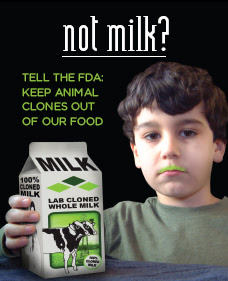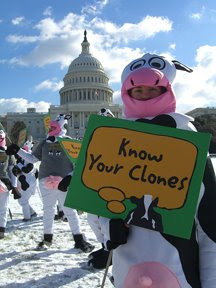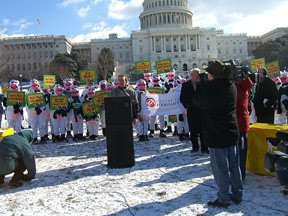Precedent-setting Decision May Block Planting, Sales of Monsanto Alfalfa
In a decision handed down yesterday, a Federal Court has ruled, for the first time ever, that the U.S. Department of Agriculture failed to abide by federal environmental laws when it approved a genetically engineered crop without conducting a full Environment Impact Statement (EIS).
In what will likely be a precedent-setting ruling, U.S. District Court Judge Charles R. Breyer of the Northern District of California decided in favor of farmers, consumers, and environmentalists who filed a suit calling the USDA’s approval of genetically engineered (GE) alfalfa a threat to farmers’ livelihoods and a risk to the environment. Judge Breyer ordered that a full Environmental Impact Statement must be carried out on “Roundup Ready” alfalfa, the GE variety developed by Monsanto and Forage Genetics. The decision may prevent this season’s sales and planting of Monsanto’s GE alfalfa and future submissions of other GE crops for commercial deregulation.
Judge Breyer concluded that the lawsuit, brought last year by a coalition of groups led by the Center for Food Safety, raised valid concerns about environmental impacts that the USDA failed to address before approving the commercialization and release of Roundup Ready alfalfa.
In his ruling, the judge consistently found USDA’s arguments unconvincing, without scientific basis, and/or contrary to the law. For example:
* The judge found that plaintiffs’ concerns that Roundup Ready alfalfa will contaminate natural and organic alfalfa are valid, stating that USDA’s opposing arguments were “not convincing” and do not demonstrate the “hard look” required by federal environmental laws. The ruling went on to note that “…For those farmers who choose to grow non-genetically engineered alfalfa, the possibility that their crops will be infected with the engineered gene is tantamount to the elimination of all alfalfa; they cannot grow their chosen crop.”
* USDA argued that, based on a legal technicality, the agency did not have to address the economic risks to organic and conventional growers whose alfalfa crop could be contaminated by Monsanto’s GE variety. But the judge found that USDA “overstates the law…Economic effects are relevant “when they are ‘interelated’ with ‘natural or physical environmental effects.’…Here, the economic effects on the organic and conventional farmers of the government’s deregulation decision are interrelated with, and, indeed, a direct result of, the effect on the physical environment.”
* Judge Breyer found that USDA failed to address the problem of Roundup-resistant “superweeds” that could follow commercial planting of GE alfalfa. Commenting on the agency’s refusal to assess this risk, the judge noted that “Nothing in NEPA, the relevant regulations, or the caselaw support such a cavalier response.”
“This is a major victory for farmers and the environment,” said Andrew Kimbrell, Executive Director of the Center for Food Safety. “Not only has a Federal Court recognized that USDA failed to consider the environmental and economic threats posed by GE alfalfa, but it has also questioned whether any agency in the federal government is looking at the cumulative impacts of GE crop approvals.”
“This is another nail in the coffin for USDA’s hands-off approach to regulations on these risky engineered crops,” said Will Rostov, Senior Attorney of The Center for Food Safety, which just last week won another judgment calling for USDA to provide more environmental documentation for any new GE field trials.
“This ruling will help protect my rights as a consumer to choose, and I choose organic foods whenever and wherever I can,” said Dean Hulse, Fargo, ND-based spokesperson for Dakota Resource Council and the Western Organization of Resource Councils. “The decision rejects Monsanto’s claims that transgenic crops are safe for the environment. Many people have been skeptical of those claims, and now we have a judge who’s skeptical as well – a judge who has actually studied the facts.”
The suit also cited the urgent concerns of farmers who sell to export markets. Japan and South Korea, America’s most important alfalfa customers, have warned that they will discontinue imports of U.S. alfalfa if a GE variety is grown in this country. U.S. alfalfa exports total nearly $480 million per year, with about 75% headed to Japan. The Court disagreed with USDA’s assertion that exports to Japan would not be harmed by deregulation of GE alfalfa.
“Today's ruling reinforces what Sierra Club has been saying all along: the government should look before it leaps and examine how genetically engineered alfalfa could harm the environment before approving its widespread use,” said Neil Carman of the Sierra Club’s genetic engineering committee. “That's just plain common sense.”
Alfalfa is grown on over 21 million acres, and is worth $8 billion per year (not including the value of final products, such as dairy), making it the country’s third most valuable and fourth most widely grown crop. Alfalfa is primarily used in feed for dairy cows and beef cattle, and it also greatly contributes to pork, lamb, sheep, and honey production. Consumers also eat alfalfa as sprouts in salads and other foods.
“We applaud the decision of the Court,” said Bill Wenzel of the National Family Farm Coalition. “It’s unfortunate that we have to turn to judges to do what’s right for farmers while the USDA carries water for the biotech companies.”
Pat Trask of Trask Family Seeds, a South Dakota conventional alfalfa grower and plaintiff in the case stated: “It’s a great day for God’s own alfalfa.”
The Center for Food Safety represented itself and the following co-plaintiffs in the suit: Western Organization of Resource Councils, National Family Farm Coalition, Sierra Club, Beyond Pesticides, Cornucopia Institute, Dakota Resource Council, Trask Family Seeds, and Geertson Seed Farms.
For more information, please visit
www.centerforfoodsafety.org .
 Sam Fromartz, blogger, reporter, and author of Organic, Inc has an exclusive story at his blog Chews Wise on Dean Foods' announcment to ban the use of dairy products from cloned animals. Dean's announcement follows similar actions from Ben & Jerry's, Clover-Stornetta, Organic Valley, Straus Family Creamery, Stonyfield Farms, and retailers Whole Foods and Wild Oats, though Dean's decision may have the biggest impact on the commercialization of clones to date, at least in the dairy industry. Dean Foods sells dairy under more than 50 different brands, including Berkeley Farms, Borden, AltaDena, Land O' Lakes, Garelick, Hershey's Milk, Meadow Gold and Verifine. Dean also sells under many private label supermarket brands, and owns Horizon Dairy, the country's largest organic milk brand. Dean Foods is the industry leader, raking in over $10 billion in annual sales.
Sam Fromartz, blogger, reporter, and author of Organic, Inc has an exclusive story at his blog Chews Wise on Dean Foods' announcment to ban the use of dairy products from cloned animals. Dean's announcement follows similar actions from Ben & Jerry's, Clover-Stornetta, Organic Valley, Straus Family Creamery, Stonyfield Farms, and retailers Whole Foods and Wild Oats, though Dean's decision may have the biggest impact on the commercialization of clones to date, at least in the dairy industry. Dean Foods sells dairy under more than 50 different brands, including Berkeley Farms, Borden, AltaDena, Land O' Lakes, Garelick, Hershey's Milk, Meadow Gold and Verifine. Dean also sells under many private label supermarket brands, and owns Horizon Dairy, the country's largest organic milk brand. Dean Foods is the industry leader, raking in over $10 billion in annual sales.




